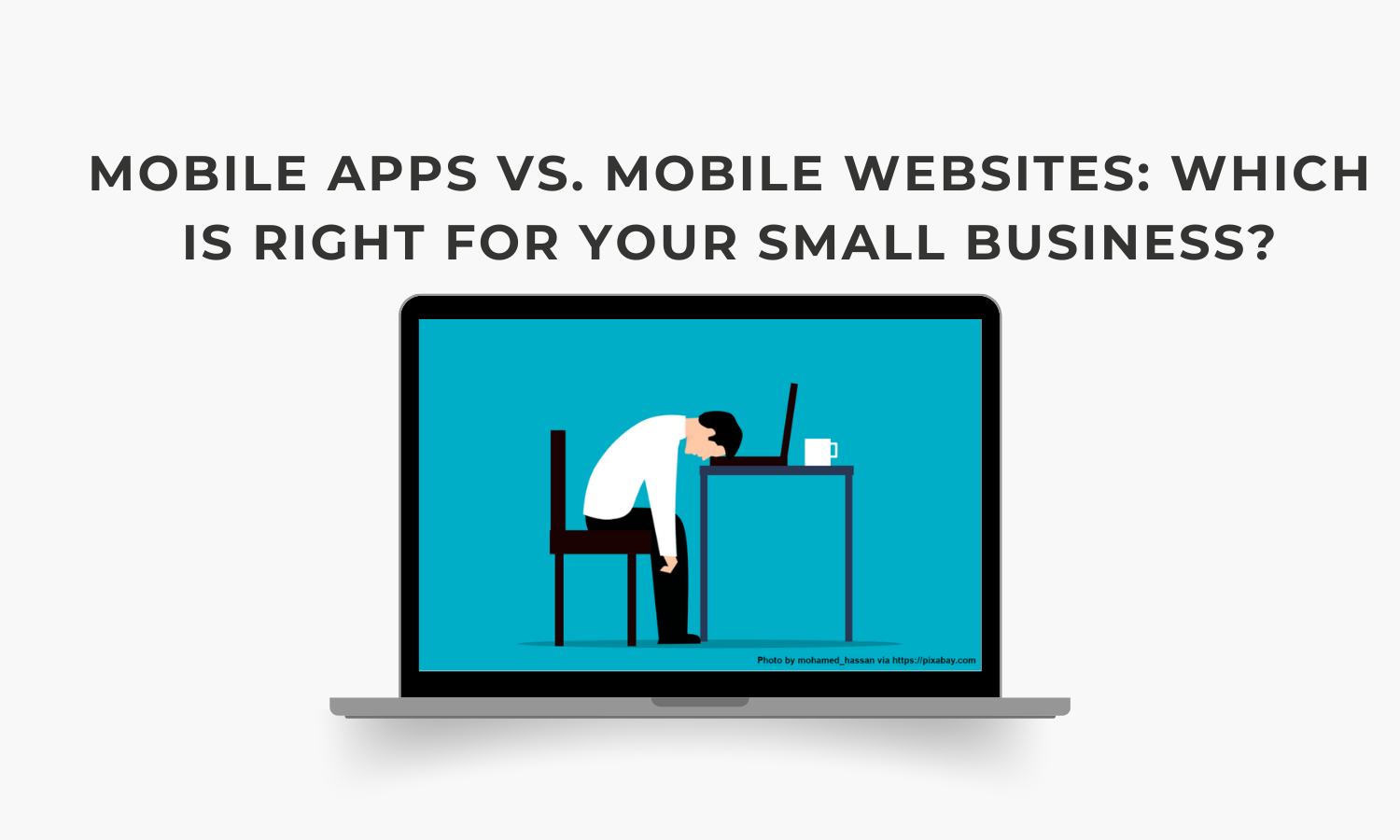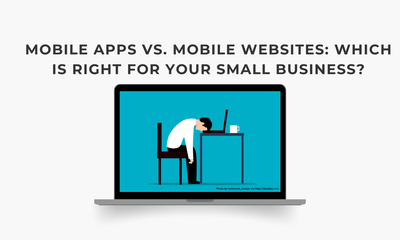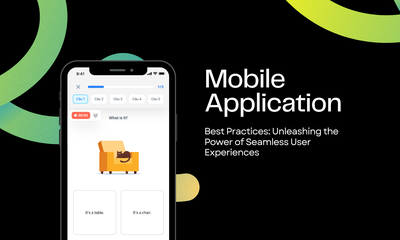Ứng dụng di động hay website di động: Phương án nào phù hợp với doanh nghiệp nhỏ của bạn?
By JoeVu, at: 08:20 Ngày 09 tháng 7 năm 2023
Thời gian đọc ước tính: __READING_TIME__ phút


Không thể phủ nhận rằng việc có một sự hiện diện trực tuyến mạnh mẽ là cực kỳ quan trọng đối với các doanh nghiệp nhỏ. Với việc sử dụng điện thoại thông minh ngày càng tăng, điều cần thiết là tối ưu hóa doanh nghiệp của bạn cho các thiết bị di động. Khi nói đến việc tiếp cận đối tượng của bạn trên thiết bị di động, bạn có hai lựa chọn chính: ứng dụng di động và trang web di động. Nhưng đâu là lựa chọn phù hợp cho doanh nghiệp nhỏ của bạn? Trong bài viết này, chúng ta sẽ khám phá sự khác biệt giữa ứng dụng di động và trang web di động, cân nhắc những ưu điểm và nhược điểm của chúng, và cung cấp cho bạn những hiểu biết để giúp bạn đưa ra quyết định sáng suốt.
1. Giới thiệu
Ứng dụng di động và trang web di động đều được thiết kế để nâng cao trải nghiệm người dùng trên điện thoại thông minh và máy tính bảng. Tuy nhiên, chúng khác nhau về chức năng, giao diện người dùng (UI/UX) và phương pháp phát triển. Việc hiểu những khác biệt này là rất quan trọng khi quyết định lựa chọn nào phù hợp nhất với mục tiêu kinh doanh của bạn.
2. Hiểu về Ứng dụng Di động và Trang Web Di động/Phản Hồi
Ứng dụng di động là các ứng dụng được thiết kế đặc biệt để tải xuống và cài đặt trên thiết bị di động của người dùng. Chúng được xây dựng cho các nền tảng cụ thể, chẳng hạn như iOS hoặc Android, và có thể cung cấp trải nghiệm nhập vai và tương tác hơn.
Mặt khác, trang web di động là các trang web được tối ưu hóa để xem trên thiết bị di động, có thể truy cập thông qua trình duyệt web mà không cần cài đặt.
3. Ưu điểm và Nhược điểm của Ứng dụng/Trang Web Di động
Ứng dụng Di động
Ưu điểm
- Chức năng nhiều hơn: Chúng có thể tận dụng đầy đủ khả năng của thiết bị người dùng, bao gồm cả thông báo đẩy, truy cập ngoại tuyến và truy cập vào các tính năng của thiết bị như máy ảnh và GPS
- Trải nghiệm người dùng tốt hơn: Chúng có thể cung cấp trải nghiệm cá nhân hóa hơn, cho phép doanh nghiệp tùy chỉnh nội dung và tính năng cho từng người dùng
- Lòng trung thành cao hơn: Người dùng di động có thể truy cập ứng dụng ở bất cứ đâu, ngay cả khi không có Internet.
Nhược điểm
- Chi phí cao hơn: Phát triển và duy trì ứng dụng di động có thể tốn kém và tốn thời gian hơn so với trang web di động
- Khó khăn cập nhật: Cập nhật ứng dụng yêu cầu tải xuống mới, và một số phiên bản mới yêu cầu hệ điều hành di động cao hơn. Điều này gây bất tiện cho nhiều người dùng.
Trang Web Di động
Ưu điểm
- Dễ sử dụng: Chúng dễ dàng truy cập thông qua trình duyệt web, loại bỏ nhu cầu tải xuống và cài đặt
- Chi phí thấp hơn: Trang web di động/Phản hồi cũng có xu hướng có chi phí phát triển thấp hơn và thường dễ bảo trì hơn so với ứng dụng
- Cập nhật tức thì: các bản cập nhật mới được triển khai/phát hành dễ dàng và không cần hành động thêm của người dùng.
Nhược điểm
- Chức năng và trải nghiệm ít hơn: Chúng có thể không cung cấp cùng mức độ chức năng và trải nghiệm người dùng như ứng dụng di động
4. Các Yếu tố Cần Xem Xét đối với Doanh nghiệp Nhỏ
Khi quyết định giữa ứng dụng di động và trang web di động, có một số yếu tố mà các doanh nghiệp nhỏ nên xem xét.
Điều đầu tiên và quan trọng nhất, điều cần thiết là hiểu đối tượng mục tiêu và sở thích của họ. Nếu đối tượng mục tiêu của bạn chủ yếu bao gồm những người am hiểu công nghệ, những người đánh giá cao trải nghiệm cá nhân hóa, thì ứng dụng di động có thể là cách tốt nhất. Mặt khác, nếu đối tượng của bạn đa dạng hơn và thích truy cập thông tin nhanh chóng và dễ dàng, thì trang web di động có thể phù hợp hơn.
Các yếu tố khác cần xem xét bao gồm ngân sách, hạn chế về thời gian và các mục tiêu và tính năng cụ thể bạn muốn đạt được. Đánh giá độ phức tạp của chức năng mong muốn của bạn và đánh giá xem ứng dụng di động hay trang web di động có thể đáp ứng tốt hơn những nhu cầu đó.
5. Lựa Chọn giữa Ứng dụng Di động và Trang Web Di động
Khi đưa ra quyết định cuối cùng, điều quan trọng là phải cân nhắc những ưu điểm và nhược điểm mà chúng ta đã thảo luận trước đó. Cân nhắc các yêu cầu kinh doanh, đối tượng mục tiêu, nguồn lực sẵn có và mục tiêu dài hạn của bạn. Trong một số trường hợp, sự kết hợp của cả ứng dụng di động và trang web di động có thể là giải pháp tối ưu. Ví dụ: bạn có thể có một trang web di động để cung cấp thông tin chung và một ứng dụng di động cho các tính năng nâng cao hơn hoặc chương trình khách hàng thân thiết.
Hãy nhớ rằng, quyết định giữa ứng dụng di động và trang web di động không phải là cố định. Bạn có thể bắt đầu với một tùy chọn và mở rộng sang tùy chọn kia khi doanh nghiệp của bạn phát triển và tiến hóa.
Tốt hơn hết là nên bắt đầu với trang web di động/phản hồi trước, sau đó khi doanh nghiệp phát triển và yêu cầu thêm chức năng, đó là lúc cần đến ứng dụng di động.
7. Các Thực Hành Tốt nhất để Phát Triển Ứng dụng Di động và Trang Web Di động
Cho dù bạn chọn ứng dụng di động, trang web di động hay cả hai, điều cần thiết là phải tuân theo các thực tiễn tốt nhất để đảm bảo sự hiện diện di động thành công. Dưới đây là một vài lời khuyên cần ghi nhớ:
-
Thiết kế Phản hồi: Nếu bạn chọn trang web di động, hãy đảm bảo rằng nó phản hồi và thích ứng liền mạch với các kích thước và độ phân giải màn hình khác nhau.
-
Trải nghiệm người dùng trực quan: Tập trung vào việc tạo giao diện và điều hướng thân thiện với người dùng để nâng cao trải nghiệm người dùng. Hãy đảm bảo thiết kế phù hợp với nhận diện thương hiệu của bạn.
-
Tối ưu hóa hiệu suất: Cả ứng dụng di động và trang web di động đều nên được tối ưu hóa về tốc độ và hiệu suất. Người dùng mong đợi thời gian tải nhanh và tương tác mượt mà.
-
Bảo mật và Quyền riêng tư: Chú ý đến các biện pháp bảo mật và quyền riêng tư dữ liệu để bảo vệ thông tin của người dùng. Thực hiện các cơ chế mã hóa và xác thực phù hợp.
-
Cập nhật và bảo trì thường xuyên: Giữ cho ứng dụng hoặc trang web di động của bạn được cập nhật với các tính năng mới nhất, sửa lỗi và bản vá bảo mật. Thường xuyên theo dõi và tối ưu hóa hiệu suất.
8. Kết luận
Tóm lại, việc lựa chọn giữa ứng dụng di động và trang web di động cho doanh nghiệp nhỏ của bạn phụ thuộc vào nhiều yếu tố như đối tượng mục tiêu, mục tiêu, yêu cầu chức năng và nguồn lực sẵn có. Ứng dụng di động cung cấp trải nghiệm nhập vai và cá nhân hóa hơn nhưng đòi hỏi nhiều đầu tư hơn về phát triển và bảo trì. Trang web di động cung cấp khả năng truy cập rộng hơn và chi phí thấp hơn nhưng có thể thiếu một số tính năng nâng cao.
Hãy xem xét nhu cầu kinh doanh cụ thể của bạn, tiến hành nghiên cứu thị trường và đánh giá sở thích của đối tượng mục tiêu. Hãy nhớ rằng quyết định này không phải là vĩnh viễn, và bạn có thể điều chỉnh và mở rộng sự hiện diện di động của mình khi doanh nghiệp phát triển. Bằng cách tiếp cận một cách chu đáo và xem xét những ưu điểm và nhược điểm, bạn có thể đưa ra quyết định sáng suốt phù hợp với mục tiêu của doanh nghiệp nhỏ.
9. Câu hỏi thường gặp
1. Tùy chọn nào hiệu quả hơn về chi phí đối với các doanh nghiệp nhỏ, ứng dụng di động hay trang web di động?
Hiệu quả về chi phí phụ thuộc vào nhiều yếu tố như độ phức tạp của chức năng cần thiết, nguồn lực phát triển và chi phí bảo trì. Nhìn chung, trang web di động hiệu quả hơn về chi phí so với ứng dụng di động do chi phí phát triển và bảo trì thấp hơn.
2. Tôi có thể có cả ứng dụng di động và trang web di động cho doanh nghiệp nhỏ của mình không?
Có, bạn có thể có cả ứng dụng di động và trang web di động. Một số doanh nghiệp chọn cách tiếp cận này để đáp ứng nhiều sở thích người dùng hơn và cung cấp các mức độ chức năng khác nhau.
3. Ứng dụng di động chỉ có sẵn cho điện thoại thông minh, hay chúng cũng có thể được phát triển cho máy tính bảng?
Ứng dụng di động có thể được phát triển cho cả điện thoại thông minh và máy tính bảng. Chúng có thể tận dụng các tính năng cụ thể và không gian màn hình lớn hơn mà máy tính bảng cung cấp để cung cấp trải nghiệm người dùng phong phú hơn.
4. Tôi nên cập nhật ứng dụng hoặc trang web di động của mình thường xuyên như thế nào?
Việc cập nhật thường xuyên rất quan trọng để duy trì hiệu suất và bảo mật tối ưu. Tần suất cập nhật phụ thuộc vào nhiều yếu tố, bao gồm sửa lỗi, tính năng mới và thay đổi yêu cầu hệ điều hành. Hãy cập nhật thông tin về xu hướng ngành mới nhất và phản hồi của người dùng để xác định lịch trình cập nhật phù hợp.
5. Tôi có cần xem xét tối ưu hóa công cụ tìm kiếm (SEO) cho ứng dụng di động không?
Mặc dù ứng dụng di động không được lập chỉ mục trực tiếp bởi công cụ tìm kiếm, nhưng việc xem xét tối ưu hóa cửa hàng ứng dụng (ASO) vẫn rất quan trọng để cải thiện khả năng hiển thị và khả năng khám phá trong cửa hàng ứng dụng. ASO bao gồm việc tối ưu hóa nhiều yếu tố, chẳng hạn như tiêu đề ứng dụng, mô tả, từ khóa và xếp hạng, để tăng lượt tải xuống tự nhiên.
6. Tôi nên ưu tiên phát triển ứng dụng di động hơn trang web di động cho doanh nghiệp nhỏ của mình không?
Ưu tiên giữa phát triển ứng dụng di động và trang web di động phụ thuộc vào mục tiêu kinh doanh, đối tượng mục tiêu và chức năng mong muốn của bạn. Hãy xem xét sở thích của đối tượng mục tiêu và các tính năng cụ thể bạn muốn cung cấp. Nếu đối tượng mục tiêu của bạn đánh giá cao trải nghiệm cá nhân hóa và nhập vai, thì ứng dụng di động có thể là ưu tiên. Tuy nhiên, nếu khả năng truy cập rộng rãi và truy cập thông tin nhanh chóng là điều quan trọng, thì việc tập trung vào trang web di động có thể là lựa chọn đúng đắn. Hãy nhớ rằng, bạn luôn có thể bắt đầu với một tùy chọn và mở rộng sang tùy chọn kia sau này khi doanh nghiệp của bạn phát triển và nhu cầu thay đổi.
7. Làm thế nào để tôi đảm bảo trải nghiệm người dùng mượt mà trên các thiết bị và nền tảng khác nhau?
Để đảm bảo trải nghiệm người dùng mượt mà, điều quan trọng là phải ưu tiên thiết kế phản hồi. Điều này có nghĩa là thiết kế ứng dụng hoặc trang web di động của bạn để thích ứng liền mạch với các kích thước màn hình, độ phân giải và hệ điều hành khác nhau. Hãy thử nghiệm ứng dụng hoặc trang web của bạn trên nhiều thiết bị khác nhau và sử dụng truy vấn phương tiện và bố cục linh hoạt để đảm bảo kết xuất và chức năng tối ưu trên các nền tảng khác nhau.
8. Có bất kỳ ngôn ngữ lập trình hoặc khung công tác cụ thể nào tôi nên xem xét cho việc phát triển ứng dụng hoặc trang web di động không?
Việc lựa chọn ngôn ngữ lập trình và khung công tác phụ thuộc vào nền tảng và yêu cầu cụ thể của ứng dụng hoặc trang web di động của bạn. Đối với việc phát triển ứng dụng di động, bạn có thể xem xét các ngôn ngữ như Swift hoặc Kotlin cho việc phát triển iOS và Android gốc, tương ứng. Ngoài ra, các khung công tác như React Native hoặc Flutter cho phép phát triển đa nền tảng. Đối với việc phát triển trang web di động, HTML5, CSS và JavaScript là các ngôn ngữ thường được sử dụng.
9. Làm thế nào để tôi quảng bá ứng dụng hoặc trang web di động của mình để thu hút người dùng?
Việc quảng bá ứng dụng hoặc trang web di động của bạn đòi hỏi một chiến lược tiếp thị toàn diện. Hãy xem xét việc sử dụng nhiều kênh khác nhau như phương tiện truyền thông xã hội, tiếp thị qua email, tiếp thị nội dung và tối ưu hóa cửa hàng ứng dụng. Hãy tương tác với đối tượng mục tiêu của bạn thông qua nội dung có liên quan và có giá trị và khuyến khích đánh giá và xếp hạng để nâng cao khả năng hiển thị của ứng dụng hoặc trang web của bạn.
10. Có thể kiếm tiền từ ứng dụng hoặc trang web di động cho các doanh nghiệp nhỏ không?
Có, có nhiều chiến lược kiếm tiền có sẵn cho ứng dụng và trang web di động. Bạn có thể khám phá các tùy chọn như mua hàng trong ứng dụng, đăng ký, quảng cáo, tài trợ hoặc bán sản phẩm kỹ thuật số. Hãy chọn một phương pháp kiếm tiền phù hợp với mô hình kinh doanh của bạn và mang lại giá trị cho người dùng mà không ảnh hưởng đến trải nghiệm của họ.
Hãy nhớ rằng, quyết định giữa ứng dụng di động và trang web di động phụ thuộc vào nhiều yếu tố độc đáo đối với doanh nghiệp nhỏ của bạn. Bằng cách cẩn thận đánh giá các yếu tố này và xem xét sở thích của đối tượng mục tiêu, bạn có thể đưa ra lựa chọn sáng suốt thúc đẩy doanh nghiệp của bạn tiến về phía trước trong bối cảnh di động.





